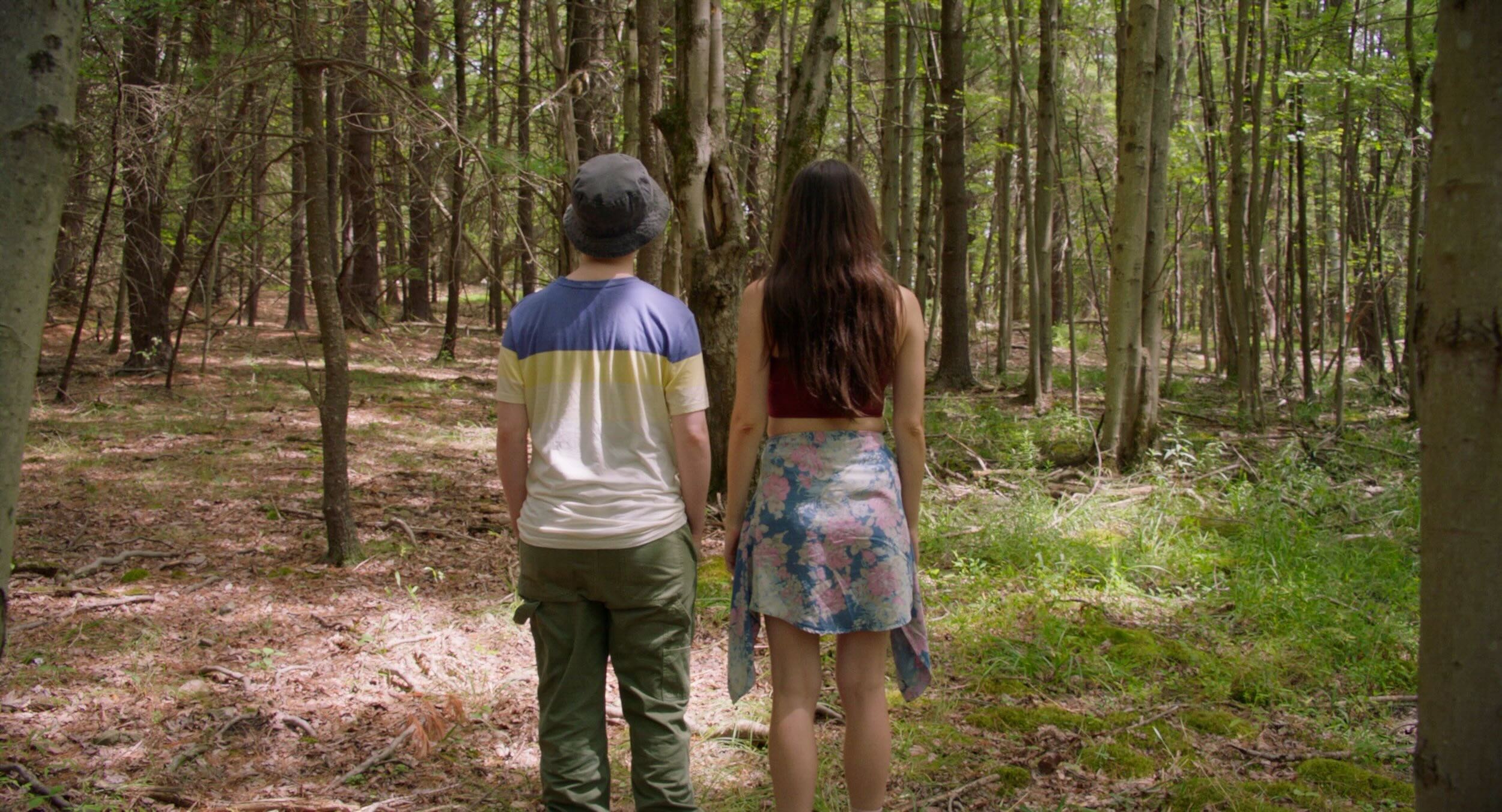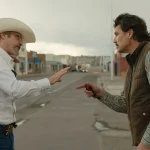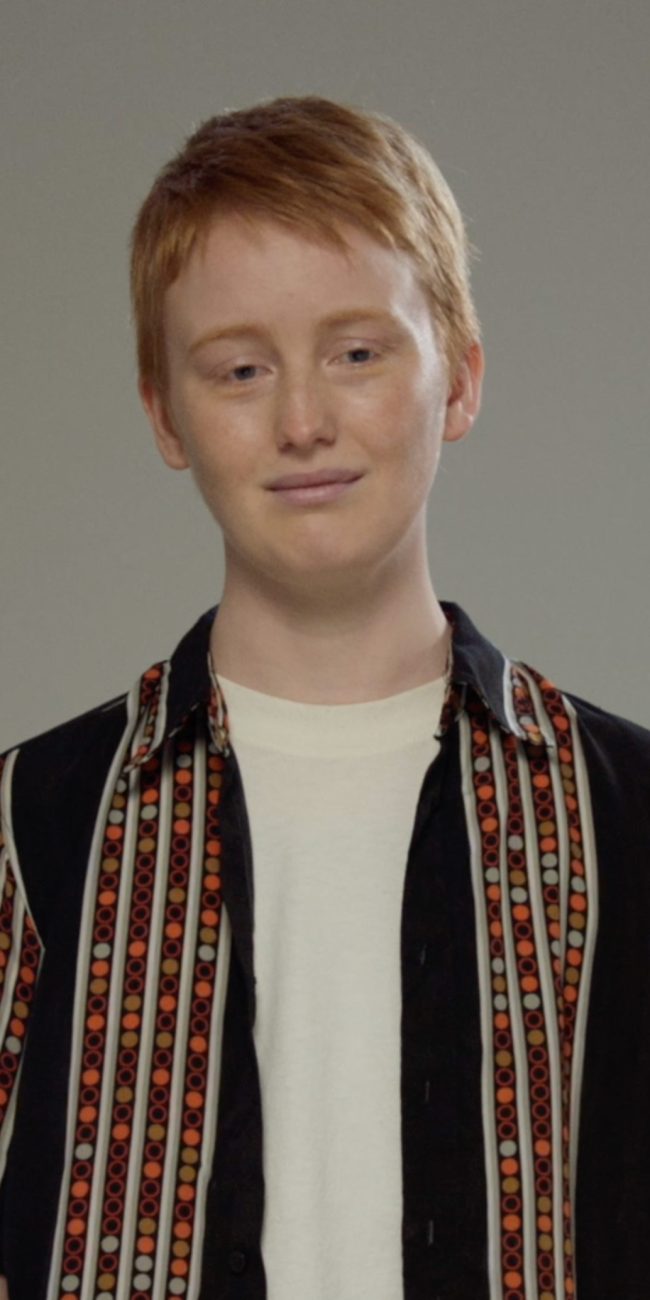SUMMER SOLSTICE

(Check out Bears Rebecca Fonté’s Summer Solstice movie review. will be released in theaters beginning June 14th in New York at the IFC Center with a national roll-out to follow. Seen it? Join the conversation with HtN on our Letterboxd Page.)
Summer Solstice opens with a very heartfelt speech coming from a trans man about finally feeling like themselves after transitioning, using the all too common metaphor from a caterpillar to a butterfly. He says “All it took was my whole life.” I have two thoughts immediately upon watching this monologue. First is general annoyance because this kid is clearly in his early 20s, and as somebody who didn’t transition until their 40s I’m like you should just enjoy how lucky you are to be living right now and have these options. [Side thought, given the state of many political platforms this summer, who knows how long we will have these options.] My second thought is how standard and obvious this speech is, the kind of dialogue that has been in so many films about being trans.
And, that’s the point. Because that’s the last moment Noah Schamus’s film ever feels like it is retreading ground that has been fertilized many times over by the steaming piles of crap that were often told are the only stories worth telling about being trans. Leo (Bobbi Salvör Menuez) is an actor, auditioning for a very generic role in some generic production, so generic in fact that the casting agent doesn’t know whether it’s going to be a role for a trans man or a trans woman as if we are interchangeable [even worse, in the first sublimely painful film of many in this drama, the casting agent has the nerve to ask Leo how he identifies, as a trans man or a trans woman].
When Leo doesn’t get the part because they decide to go in another direction [direction from what you have to ask yourself], it teases at the central theme of Summer Solstice, The general misunderstanding that cisgender people have that transgender people are playing a part in their new gender, or how transgender people feel we’ve playing a part our entire lives, and we feel ill suited for the casting. Also the play is probably written by somebody who has no understanding who we are and a terrible grasp of plot.
None of those problems exist in this film which dives in the deep end of meaningful discourse about gender identity and friendship and never lets up, all the while delivering intricate portraits of two people at the crossroads of their friendship. With an audition coming up for a part that he really wants, Leo allows himself to be swept up in the chaos of his college best friend, cisgender and straight Eleanor (Marianne Rendón). She basically kidnaps him for an impromptu road trip to upstate New York, their first time spent together since Leo began transitioning. All the dynamics are weird because, of course they are. What Eleanor doesn’t realize is that the dynamics were weird before but she was too wrapped up in her own cishet life of the party existence to notice. Now she lets loose such nuggets of analysis as “you’re not being yourself” and “it feels like you’re performing.” This person who was such a part of Leon’s past now has no place in his life, but they are both clinging to this idea of friendship out of loyalty to their collective experience.
Of course, Eleanor means well. She’s not a bad person. Schamus’s film allows her to be both Leo’s biggest cheerleader and his most difficult barrier. He still wants to like her, so we want to like her, no matter how awkward she comes off or how apparent it is that most of her life is a poorly executed lie. When their friendship reaches its final blow up because Leo calls Eleanor out on lies she has been telling about their relationship, her counter attack is “you lie to me all the time.” It has the air of truth to it and could be taken at face value, but someone trans can only hear this one way – our entire friendship is a lie because you never told me who you were inside. Even if Eleanor didn’t mean that, it’s a fear that every trans person carries with them when reacclimating too old relationships, both friends and family. It’s a bit of truth I’m not sure I’ve ever seen on screen before.
But then Schamus goes one step further and lets Eleanor voice her deepest frustration, “I know I’m not allowed to have any feelings about your transition.” Of course that’s a terrible thing to say to someone trans, but it’s also incredibly naive to think that other people are not going to have feelings about the situation. The relationship worked one way, even if only one person thought that it was working, and now in this new reality it doesn’t feel the same. Eleanor misses the old relationship. She doesn’t know how to fit into Leo’s life. This is as much about their life choices as it is about things that are not choices like gender identity, but it’s a very honest moment that I’m not sure how I was supposed to feel about it, or what the director wanted me to feel about it, or even what I DID feel about it.
This is real life. Transitioning is not easy, but it doesn’t end right after surgery. Life as a butterfly is just as hard as life as a caterpillar. It’s just easier when you know that you’re supposed to be a butterfly.
– Bears Rebecca Fonté (@BearsFonte)
Summer Solstice movie review; Noah Schamus











